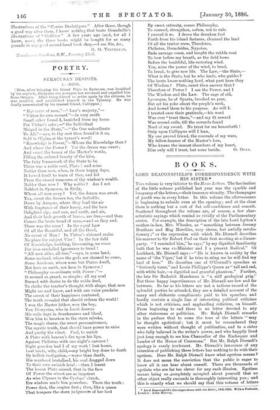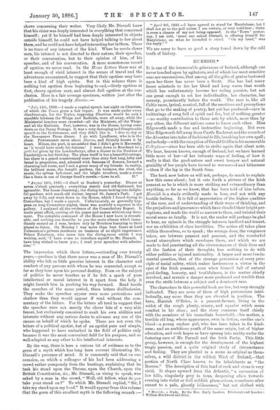BOOKS.
LORD BEACONSFIELD'S CORRESPONDENCE WITH HIS SISTER.*
Tuis volume is very inferior to the Home Letters. The fascination of the little volume published last year was the sparkle and buoyancy of the letters,—their immense vivacity. The champagne of youth was in every letter. In this volume the effervescence is beginning to subside even at the opening ; and at the close there is nothing but a sort of flat self-confidence and conceit. Scattered throughout the volume are, of course, a few char- acteristic sayings which remind us vividly of the Parliamentary orator. For example, the description of the late Lord Lytton's mother-in-law, Mrs. Wheeler, as "something between Jeremy Bentham and &leg Merrilies, very clever, but awfully revolu- tionary ;" or the expression with which Mr. Disraeli describes his manner to Sir Robert Peel on their first meeting at a dinner- party. "I reminded him," he says," by my dignified familiarity both that he was ex-Minister and I a present Radical." Of Lockhart, Mr. Disraeli says :—"He is known in society by the name of the Viper,' but if he tries to sting me he will find my heel of iron." He describes one of O'Connell's speeches as "furiously tame," and Louis Phillippe's Queen as "tall and sad, with white hair,—a dignified and graceful phantom." Farther, the late Sir Roderick Murchison is "a stiff geological prig.' But these happy impertinences of Mr. Disraeli are few and far between. So far as his letters are not a tedious record of the splendid parties he attended, they are a detailed account of the many and elaborate compliments paid to his speeches, and hardly contain a single line of interesting political criticism which is not criticism, and applauding criticism, on himself. From beginning to end there is no letter devoted to any other statesman or politician. Mr. Ralph Disraeli remarks in the preface that to some the tone of the letters "may be thought egotistical ; but it must be remembered they were written without thought of publication, and to a sister who fully believed in the writer's power, and who happily lived just long enough to see him Chancellor of the Exchequer and Leader of the House of Commons." But Mr. Ralph Disraeli's apology is surely irrelevant. Mr. Disraeli's innocence of any intention of publishing these letters has nothing to do with their egotism. Does Mr. Ralph Disraeli know what egotism means It does not mean the conviction that the public is eager to know all it can hear about oneself. There are thousands of egotists who are far too clever for any such illusion. Egotism means being 80 ,e,ompletely occupied about yourself that no other object really succeeds in thoroughly interesting you ; and this is exactly what we should say that this volume of letters • Lord Nownsfuld's Correspondence with kis Sister, 1832-1852. With.. Portrait.. London: John Murray. shows concerning their writer. Very likely Mr. Disraeli knew that his sister was deeply interested in everything that concerned himself ; yet if he himself had been deeply interested in objects outside himself, he could not have helped talking to her about them, and he could not have helped interesting her in them. There is no trace of any interest of the kind. When he meets clever men, his interest is not directed to their nature, their speeches, or their conversation, but to their opinion of him, of his speeches, and of his conversation. A more monotonous record of egotism we never read. In the Home Letters there was at least enough of vivid interest in the scenes of travel and the adventures encountered, to suggest that their egotism may have been a kind of high spirits. But in this volume there is nothing but egotism from beginning to end,—lively egotism at first, cheery egotism next, and almost dull egotism at the con- clusion. Here is a fair average specimen, written just after the publication of his tragedy Alareos : — "July 13th, 1839.-1 made a capital speech last night on Chartism, of which the Times gives a fair report. It was made under every -disadvantage, for the Tories, supposing Chartism would be only a squabble between the Whigs and Radicals, were all away, while the Ministerial benches were crowded—all the Ministers, all the Whigs, and all the Radicals. Peel, however, was in the House, having come down on the Penny Postage. It was a very damaging and disagreeable speech to the Government, and they didn't like it. I dine to-day at the Newspaper Press dinner. I go with Lyndhurst, who is in the -chair. Powerscourt raves about Alarcos, and literally knows it by heart. Milnes, the poet, is astonished that I didn't give it Macretuly, as would have made his fortune.' I went down to Rosebank to a petit bal given by the Londonderrys, after a dinner to the Duchess of Cambridge on her birthday. The place itself is but a beautiful cottage, but there is a grand conservatory more than sixty feet long, lofty and broad in proportion, and, adorned with festoons of flowers, formed a -charming ball-room, and I met a great many of my friends. In reality, the brilliant moon, the himplit gardens, the terraces, the river, the music, the sylvan ball-room, and the bright revellers, made a scene
like a testa in one of George Sand's novels.—Love to all. D."
"August 13th, 1839.-1 dined at Burdett'a yesterday. Dinner at seven o'clock precisely ; everything stately and old-fashioned, but agreeable. The house charming; the dining-room looking into delight- ful gardens, with much old timber, beyond St. James's Park. I got away by 9.30, and went down to the House, which I found dozing in Committee, but I made a speech. Unfortunately, as generally hap- pens on long Committee nights, there was scarcely a reporter in the gallery. I analysed all the evidence of the Constabulary Report. It made great effect, quoting all the pages and names without any docu- ment. The complete command of the House I now have is remark- able, and nothing can describe to you the mute silence which imme- diately ensued as I rose, broken only by Members hurrying to their places to listen. On Monday I was more than four hours at Lord Palmerston's private residence on business of no slight importance. Prince Esterhazy, who came into the dining-room whilst I was waiting, said, I have come to introduce myself to Mr. Disraeli. I have long wished to know you ; I read your speeches with admira- tion.' "
The impression which these letters,—extending over twenty years,—produce is that there never was a man of Mr. Disraeli's ability who felt so little genuine interest in the character and -conduct of any persons with whom he was connected, except so far as they bore upon his personal destiny. Even on the subject of politics he never touches as if he felt a spark of pure intellectual or moral interest in it apart from the help it might furnish him in pushing his way forward. Read beside the speeches of the same period, these letters disillusionise. They make the speeches appear even more pretentious and shallow than they would appear if read without the com- mentary of the letters. For the letters all tend to suggest that the speeches were not merely the clever hits of a very able fencer, but exclusively conceived to exalt his own abilities and interests without any serious desire to advance any one of the -causes on behalf of which he spoke. These are not even the letters of a political egotist, but of an egotist pure and simple, who happened to have embarked in the field of politics only because it was the most convenient field for his purpose, and as well-adapted as any other to his intellectual interests.
By the way, there is here a curious bit of evidence as to the germ of a myth which has long been current illustrating Mr.
Disraeli's presence of mind. It is commonly said that on one occasion, on which a colleague of his had been addressing a crowd rather pompously from the hustings, explaining that he took his stand upon the Throne, upon the Church, upon the British Constitution, So., Mr. Disraeli, on rising to speak, was asked by a man in the crowd, "Well, old fellow, what do you
-take your stand on ?" To which Mr. Disraeli replied, "Sir, I take my stand upon my head." It would appear from this volume that the germ of this excellent myth is the following remark :— " April 8th, 1833.-1 have agreed to stand for Marylebone, but I shall not go to the poll unless I am certain, or very oon6dent ; there is even a chance of my not being opposed. In the 'Town' yester- day, I am told, some one asked Disraeli, in offering himself for Marylebone, on what he intended to stand. "On my head," was the reply.' "
We are sorry to have so good a story toned down by the cold truth of history.



































 Previous page
Previous page